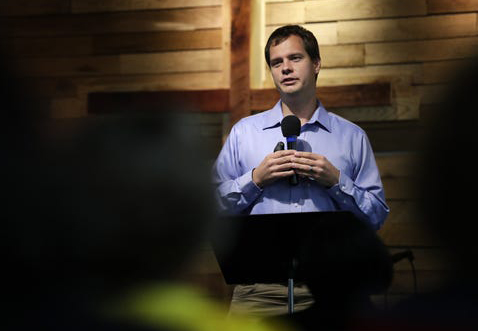Biblical Principles on Restitution Based Immigration Reform: An Interview With Matthew Soerens
 What does the Bible say about immigrants, and how does it apply to discussions around immigration policy in the US today? In an interview with TexasGOPVote, Matthew Soerens, National Coordinator of the Evangelical Immigration Table, discussed his organization’s recent call for restitution based immigration reform. As a Christian myself, Soerens’ explanation of the Evangelical Immigration Table’s principles makes a lot of sense.
What does the Bible say about immigrants, and how does it apply to discussions around immigration policy in the US today? In an interview with TexasGOPVote, Matthew Soerens, National Coordinator of the Evangelical Immigration Table, discussed his organization’s recent call for restitution based immigration reform. As a Christian myself, Soerens’ explanation of the Evangelical Immigration Table’s principles makes a lot of sense.
Soerens explained how scripture guides Evangelical Christians to support immigration reform that respects the rule of law and guarantees secure borders, while also establishing a path for undocumented immigrants who can pass background checks to pay restitution and earn their legal status. Romans 13:1 says, “Let everyone be subject to the governing authorities, for there is no authority except that which God has established.”
Soerens says, “For us at the Evangelical Immigration Table, our motivation for this is really all fueled by the Bible. Evangelical Christians are defined in many ways by our commitment to the authority of the scriptures. The Bible has a lot to say and forms our thinking on this topic.”
Perhaps that is part of why 68% percent of Evangelicals support immigration law changes that both increase border security and provide a path for undocumented immigrants to earn their legal status.
Guided by biblical teachings, the Evangelical Immigration Table has asked lawmakers to act in ways guided by these principles:
- We support solutions to the problem of immigrants being in our country illegally that strengthen the rule of law while making both the law and its enforcement more responsive to our needs and values.
- We recognize that the law has in many cases not worked well, has been inconsistently enforced, and has been violated both by the immigrants present without authorization and by the employers who employ them without authorization.
- We support a process of restitution (not amnesty) where violation of law is admitted to and significant fines/penalties are paid by immigrants (in installments over a period of seven years) who came illegally (or overstayed a visa) as adults, leading to a pathway to Legal Permanent Residency if qualifications are met. Immigrants who were brought to the US unlawfully or overstayed a visa as children (Dreamers) would go through a process where they can get onto a pathway to Legal Permanent Residency if qualifications are met.
- We encourage fairness to taxpayers by requiring that all immigrants be self-sufficient, work, pay taxes, and be productive, or be in families and households that are doing so.
- We encourage our government to establish a secure border and an efficient and orderly process of immigration.
Soerens emphasized that these principles are based on the Bible telling us to honor the law, while also telling us to be compassionate to immigrants and to honor and protect the family unit.
“On one hand, most people agree that a mass deportation policy is neither realistic in terms of the processes involved, nor particularly humane as it would involve separating all sorts of families and parents who are unlawfully present but have citizen kids. On the other hand, most evangelicals are not comfortable with idea of an amnesty that basically just says ‘well you broke the law but we’re going to ignore that and give you citizenship.’ For Christians who think we have to respect the law for biblical reasons, but also that we have to keep families together whenever possible, it can feel like a dilemma. But that’s why we believe this is the right way forward,” he explained.
He also stressed the importance of having undocumented immigrants pay restitution through a process of paying a fine and earning legal status in order to get right with the law.
“This is not amnesty, it’s not a free pass, but it’s also neither a mass deportation plan, which is not realistic, nor the status quo, which is its own form of amnesty, pretending that the law has not been violated and just looking the other way,” he said.
Soerens also pointed out that Jesus Christ himself was an immigrant and refugee. “He and his family were forced to flee from Bethlehem to Egypt…An angel tells Joseph to get up in the middle of the night to leave and escape to Egypt to avoid King Herod’s genocide of little baby boys in Bethlehem. It’s important to keep in mind that we are followers of a refugee,” he said.
One recurrent theme is God’s love of the foreigner and his command that we do the same. The great commandment tells us to love thy neighbor as thyself, Soerens said. Leviticus 19:33-34 says, “When a foreigner resides among you in your land, do not mistreat them. The foreigner residing among you must be treated as your native-born. Love them as yourself, for you were foreigners in Egypt.”
Similarly, Deuteronomy 10: 17-19 says, “For the Lord your God is God of gods and Lord of lords, the great God, mighty and awesome, who shows no partiality and accepts no bribes. He defends the cause of the fatherless and the widow, and loves the foreigner residing among you, giving them food and clothing. And you are to love those who are foreigners, for you yourselves were foreigners in Egypt.”
Soerens has a call to action for Christians: “You have the great commission, which for Christians is this idea of making disciples of all nations. A lot of churches have recognized that as people from various countries come into the US there is opportunity for us to live out that commission in our community.”
More information about what the Bible has to say about immigration can be found in the Evangelical Immigration Table’s “Thinking Biblically about Immigrants and Immigration Reform” report.








